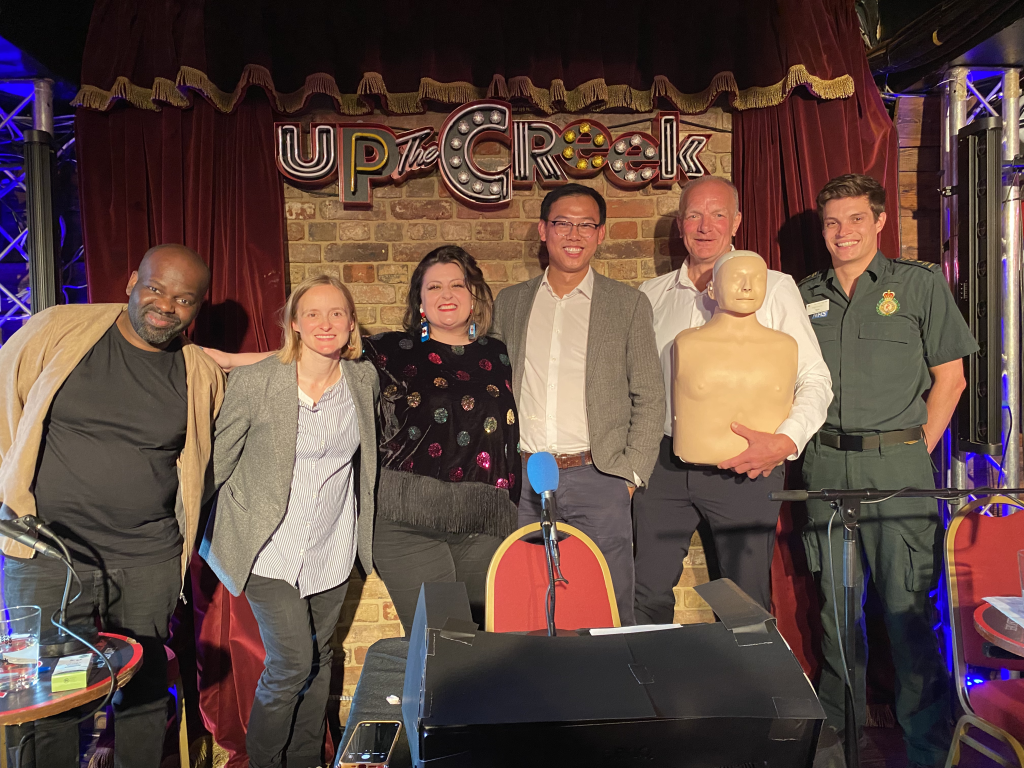Paramedic joins BBC Radio 4 comedy show panel to make the serious case for defibrillators
A paramedic at London Ambulance Service will feature in the hit BBC podcast Best Medicine to promote defibrillators – devices which can help restart someone’s heart if it stops beating.

Paramedic Thomas Martin joined a panel of professors and comedians to convince the host – comedian Kiri Pritchard-McLean – that the life-saving defib is the best medicine.
He explained how the machine delivers an electric shock to the heart through pads applied to a person’s body when they are in cardiac arrest and can help the heart start beating in a normal rhythm again.
On the light-hearted show, he debated with experts arguing for a vaccine to treat urinary tract infections and origami surgical capsules as well as a comedian advocating denial as the best medicine.
Find out at 6.30pm tonight (19 November) on BBC Radio 4 (or wherever you get your podcasts) whether he persuaded the host Kiri about the defib’s “shock” value.
Thomas said: “Defibrillators are misunderstood! While people might have heard of them, most people think you need medical training to use one.
“That’s not true – they’re safe and you don’t need to be a paramedic to use one. Anyone can use a defibrillator and save a life.
“I went on the programme to show how simple they are to use and how important it is for people to learn basic life-saving skills like CPR.”
Thomas brought a defibrillator to the recording of the show and explained to Kiri how to use it, in front of a live audience. Viewers watched as the device announced simple instructions for Kiri to follow. CLIP
The paramedic also explained how London Ambulance Service is aiming to create a generation of lifesavers by providing free training for schoolchildren across the capital, through its London Lifesavers Campaign.
In the show he says: “Thanks to training like this, we have children who have saved their parent’s life.”
At the moment, fewer than one in 10 people survive a cardiac arrest. Chest compressions and using a defibrillator can give a fivefold increase in someone’s chance of survival.
The podcast also features patient David who was fit and healthy when he went into cardiac arrest after a swim at his gym in 2016.
Fortunately a manager at the gym started chest compressions and administered a shock from the gym’s defibrillator before London Ambulance Service crews arrived to continue treatment and take him to hospital.
Video cameras at the gym captured the whole episode and the video is now used for clinical training at London Ambulance Service.
In the podcast David says: “I’m one of the few people in the world who has watched himself have a cardiac arrest, clinical death and then resuscitation on CCTV in colour.”
In response, host Kiri references her stand-up comedy career and quips: “You say that but I’ve watched myself die on every terrestrial TV channel there is.”
Defibrillators are carried on all ambulances but also available in public places so they are accessible for anyone to use.
However research by analysts at London Ambulance Service found some areas in London have no access to these life-saving devices. Find out how you can support our London Heart Starters campaign to install more defibrillators here.
You can learn how to save a life here: London Lifesavers.
London Lifesavers is funded through a grant provided by NHS Charities Together to our charity, London Ambulance Charity.

Follow us on social media: